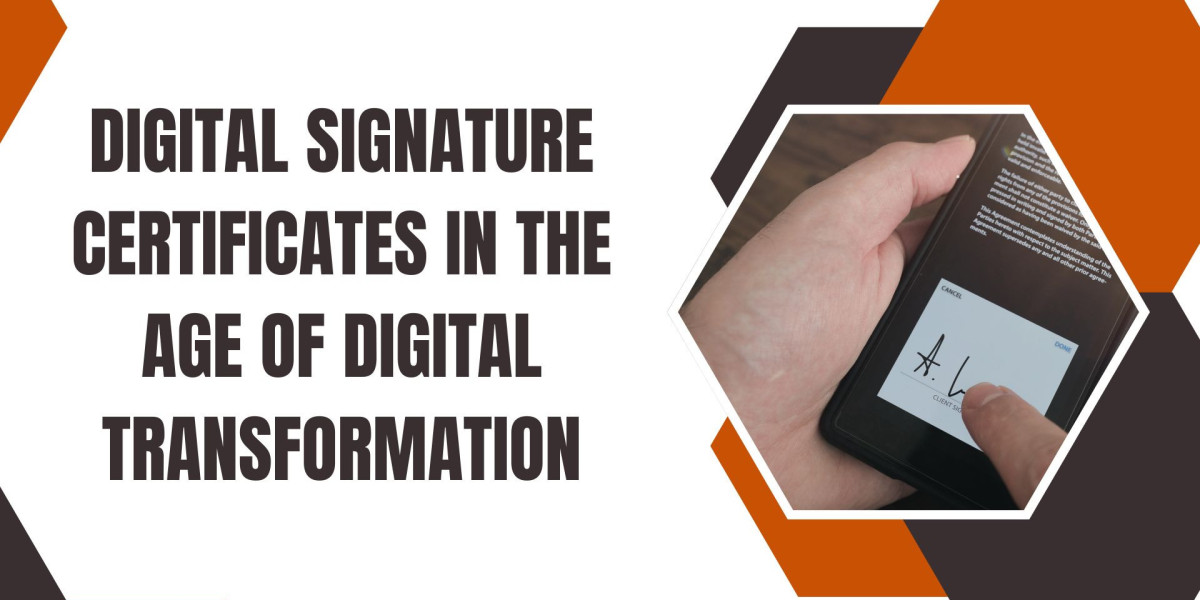In today’s rapidly evolving digital landscape, where technology permeates every aspect of life and business, Digital Signature Certificates (DSCs) have emerged as a cornerstone of trust and security. As organizations, governments, and individuals increasingly adopt digital solutions to streamline operations, enhance convenience, and ensure sustainability, DSCs play a pivotal role in enabling secure, authenticated, and legally binding digital interactions. This article delves into the multifaceted role of DSCs in the age of digital transformation, highlighting their significance, applications, and potential to revolutionize the way we conduct transactions and communicate.
What Are Digital Signature Certificates?
A Digital Signature Certificate is an electronic credential that validates the identity of the certificate holder. It is issued by a trusted Certificate Authority (CA) and contains essential information such as the holder's name, public key, expiration date, and the CA's digital signature. DSCs use public key infrastructure (PKI) to ensure the authenticity, integrity, and non-repudiation of digital documents and communications.
In essence, DSCs serve as the digital equivalent of handwritten signatures, offering an added layer of encryption and security to protect sensitive data and verify the signatory’s identity.
The Role of Digital Signature Certificates in Digital Transformation
Digital transformation refers to the integration of digital technologies into all areas of an organization, fundamentally changing how businesses operate and deliver value to customers. DSCs are instrumental in this transformation for several reasons:
1. Ensuring Trust and Security
One of the primary challenges of digital transformation is ensuring trust in online interactions. DSCs provide a secure method to authenticate users and protect sensitive information. By encrypting data and verifying the sender’s identity, DSCs mitigate the risks of fraud, data breaches, and cyberattacks, which are major concerns in the digital age.
2. Enabling Paperless Processes
Digital transformation emphasizes sustainability and efficiency, often requiring the elimination of paper-based processes. DSCs facilitate this shift by allowing users to sign, authenticate, and share documents electronically without compromising security or legal validity. This not only reduces operational costs but also minimizes environmental impact.
3. Supporting Compliance with Regulations
Governments and regulatory bodies worldwide are enacting laws to govern digital interactions. For instance, the Information Technology Act in India and the eIDAS regulation in the European Union recognize DSCs as legally binding. By implementing DSCs, organizations ensure compliance with these regulations, reducing legal risks and fostering customer trust.
4. Enhancing Operational Efficiency
DSCs streamline workflows by eliminating the need for physical signatures and manual verification processes. For businesses, this translates to faster approvals, reduced turnaround times, and improved overall productivity. Industries like banking, healthcare, and real estate, where documentation is extensive, particularly benefit from this efficiency.
5. Supporting Remote and Hybrid Work Models
With the rise of remote and hybrid work, secure digital tools are more critical than ever. DSCs enable employees and organizations to collaborate seamlessly, sign documents, and authenticate transactions from anywhere in the world, ensuring business continuity and productivity.
Steps to Apply for a Digital Signature Certificate
STEP 1:
Go to the DSC website i.e. https://edigitalsignature.org/.
STEP 2: Fill the necessary details
To proceed with your Digital Signature Certificate (DSC) application, please ensure that the following details are accurately filled out:
Select User Type, Class Type, Certificate Type: Specify the type of user (individual, organization, etc.), class of DSC (Class 3), and whether the certificate is for signature only or both signing and encryption.
Validity: Indicate the desired validity period for the DSC.
Applicant Name and Contact Details: Provide your full name, along with contact information such as phone number and email address.
Residential Address: Enter your complete residential address, including any relevant details such as apartment number, building name, pincode, city & state.
Declaration: Read the terms of services provided in the application.
Submit: Click on the submit button for further process.
STEP 3: Select the token option
If you already have a token then select no from the token option, your DSC will be downloaded on the old token but if you don’t have the token then kindly select yes.
STEP 4: Payment for DSC
Provide the necessary payment information for processing the DSC application fee. Payment can be made via online modes such as net banking, credit card, debit card, or UPI payment.
STEP 5: Issue the DSC
After completing the above steps, i.e. completing the DSC application, providing the required documents, and making the payment, submit the DSC application. The competent authority will review your application and issue the DSC electronically. They will send you an encrypted Pen Drive with your DSC by post.
Applications of Digital Signature Certificates in Key Industries
DSCs have found applications across various industries, transforming traditional processes and paving the way for innovation:
1. Financial Services
In the financial sector, DSCs are used for:
- Securing online banking transactions
- E-filing tax returns
- Authenticating loan agreements and investment contracts
- Simplifying KYC (Know Your Customer) processes
By ensuring the integrity of sensitive financial data, DSCs enhance customer confidence and streamline operations.
2. Healthcare
The healthcare industry relies on DSCs to:
- Protect patient records
- Enable secure communication between healthcare providers
- Authenticate prescriptions and medical certificates
These applications ensure compliance with data protection laws like HIPAA in the U.S. while enhancing the quality of care.
3. E-Governance
Governments use DSCs to:
- Facilitate e-tendering and procurement processes
- Authenticate official documents and certificates
- Enable seamless interactions with citizens through digital platforms
This fosters transparency, efficiency, and accountability in public administration.
4. Legal and Real Estate
In legal and real estate sectors, DSCs simplify:
- Contract execution
- Registration of property transactions
- Court filings
By reducing paperwork and enhancing security, DSCs ensure smoother transactions and compliance with legal standards.
5. Education and E-Learning
In the education sector, DSCs enable:
- Secure issuance of digital certificates and diplomas
- Authentication of e-learning content
- Verification of academic credentials
These applications enhance trust and credibility in online education platforms.
Challenges in Adopting Digital Signature Certificates
While DSCs offer numerous benefits, their adoption faces certain challenges:
1. Awareness and Education
Many businesses and individuals are unaware of DSCs and their applications. Educating users about their importance is crucial for widespread adoption.
2. Initial Costs
The cost of obtaining and implementing DSCs can be a barrier for small businesses. Governments and organizations need to subsidize or provide affordable options to encourage adoption.
3. Technical Complexity
Understanding the technical aspects of DSCs, such as PKI and encryption, can be daunting for non-technical users. Simplified interfaces and user-friendly platforms can address this issue.
4. Integration with Legacy Systems
Integrating DSCs with existing systems can be challenging for organizations with outdated infrastructure. Modernizing IT systems is essential for leveraging the full potential of DSCs.
The Future of Digital Signature Certificates
As technology continues to advance, the role of DSCs will expand, driven by trends such as:
1. Blockchain Integration
Blockchain technology can enhance the security and transparency of DSCs, making them even more robust.
2. AI-Powered Automation
Artificial intelligence can automate the issuance, management, and verification of DSCs, reducing manual effort and errors.
3. Global Standardization
Efforts to standardize DSC regulations and practices globally will facilitate cross-border transactions and collaborations.
4. IoT and Smart Devices
The integration of DSCs with IoT devices will enable secure interactions in smart ecosystems, such as smart homes and cities.
Suggested Read – Class 3 Digital Signature Certificate For eTender
Conclusion
Digital Signature Certificates are not just tools for authentication and security; they are enablers of digital transformation. By fostering trust, enhancing efficiency, and ensuring compliance, DSCs are empowering organizations and individuals to embrace a digital-first approach. As the world continues to shift towards a more connected and paperless future, DSCs will remain at the forefront, driving innovation and safeguarding the integrity of digital interactions.


